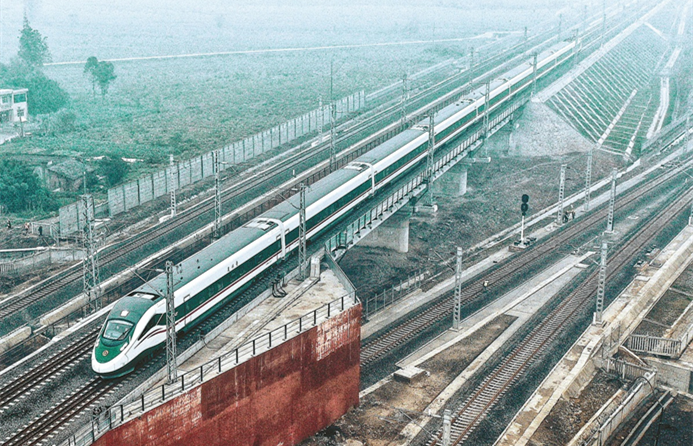
A Fuxing bullet train travels by Emeishan city in Sichuan province on Friday on the new Chengdu-Kunming rail line. [Photo by He Haiyang/For China Daily]
Overcoming extreme terrain conditions, line provides support for travel peak
A new railway line in China's southwestern region will open on Monday, slashing travel time between the region's two major cities Chengdu and Kunming, capitals of Sichuan and Yunnan provinces, the national railway operator China State Railway Group said on Saturday.
The 915-kilometer line linking Chengdu and Kunming will cut travel time between the two cities to 7.5 hours, while travel time between Chengdu and two other major cities along the way — Xichang and Panzhihua — will be slashed to 3 and 5 hours.
The line starts in Chengdu, passes through Meishan, Leshan, Liangshan Yi autonomous prefecture and Panzhihua in Sichuan, then enters Yunnan's Chuxiong Yi autonomous prefecture and ends at Kunming. It is electrified with a designed speed of 160 km per hour.
The geography along the route is complex, and the line crosses rivers and mountains including the Minjiang, Dadu and Jinsha rivers and Mount Emei, which posed difficulties for construction.
Engineers carried out intelligent surveying and made use of many tunnels and long-span bridges to overcome topographical challenges, some of which were extreme.
In all, seven tunnels of more than 10 kilometers, including the 22-kilometer Xiaoxiangling Tunnel, and 11 bridges of more than 2 kilometers, have been built along the line, which is a key project for the large-scale development of China's western region, and is an important link in the railway corridor from China to Southeast Asia.
The opening of the line has improved the railway network in the southwest, boosting railway transportation capacity. It will also greatly facilitate the movement of people and goods, boosting socioeconomic development in the region, facilitating rural vitalization and promoting opening up, the company said.
The new line is the second route linking Chengdu and Kunming. The old Chengdu-Kunming Railway, which extends for 1,096 kilometers, opened in 1970, with a designed speed of 80 km/h.
Due to the complex topography, it was once believed that some areas would be impenetrable to railways and the completion of the old railway was considered by railway experts as one of the "miracles "symbolizing the conquest of nature in the 20th century.
The line was an important strategic corridor and provided strong transportation support for economic and social development. However, with the increasing demand, the old line's capacity is no longer sufficient and so the decision was taken to build a second line linking Chengdu and Kunming.
The new line runs largely in parallel with the old one, but is taking more direct routes via long tunnels and bridges whereas the old line had to resort to extended lines to lower steepness. Sections of the new line have been completed over the past few years. The section between Emei and Mianning in Sichuan province eventually fills the last gap.
Initially, the railway department will run eight passenger train services between Chengdu and Xichang, as well as between Chengdu and Panzhihua every day, while 10 passenger train services will be run between Chengdu and Kunming.
Some 60 cargo services will also run from Chengdu to Panzhihua and Xichang every day.
Trains will be an upgraded model of the Fuxing bullet train CR200J.
The line will open in time for the upcoming 40-day annual Spring Festival travel rush, which begins on Jan 7 and ends on Feb 15.
Tickets went on sale on Saturday and this will be the first Spring Festival travel rush since new epidemic measures were introduced last month, and nucleic acid test results and health codes are no longer required for travel.
Greater passenger and cargo demand is expected during the rush, including family visits and tourism, the resumption of work and production, and coal for winter power production, the company said.
During the rush, the department will coordinate epidemic prevention and control and seek to improve services.
The company will run 12,154 passenger trains on peak days before the Chinese Lunar New Year and 12,214 on peak days after the holiday, ensuring maximum passenger capacity will be 11 percent higher compared to the Spring Festival travel rush in 2019, prior to the COVID-19 epidemic.